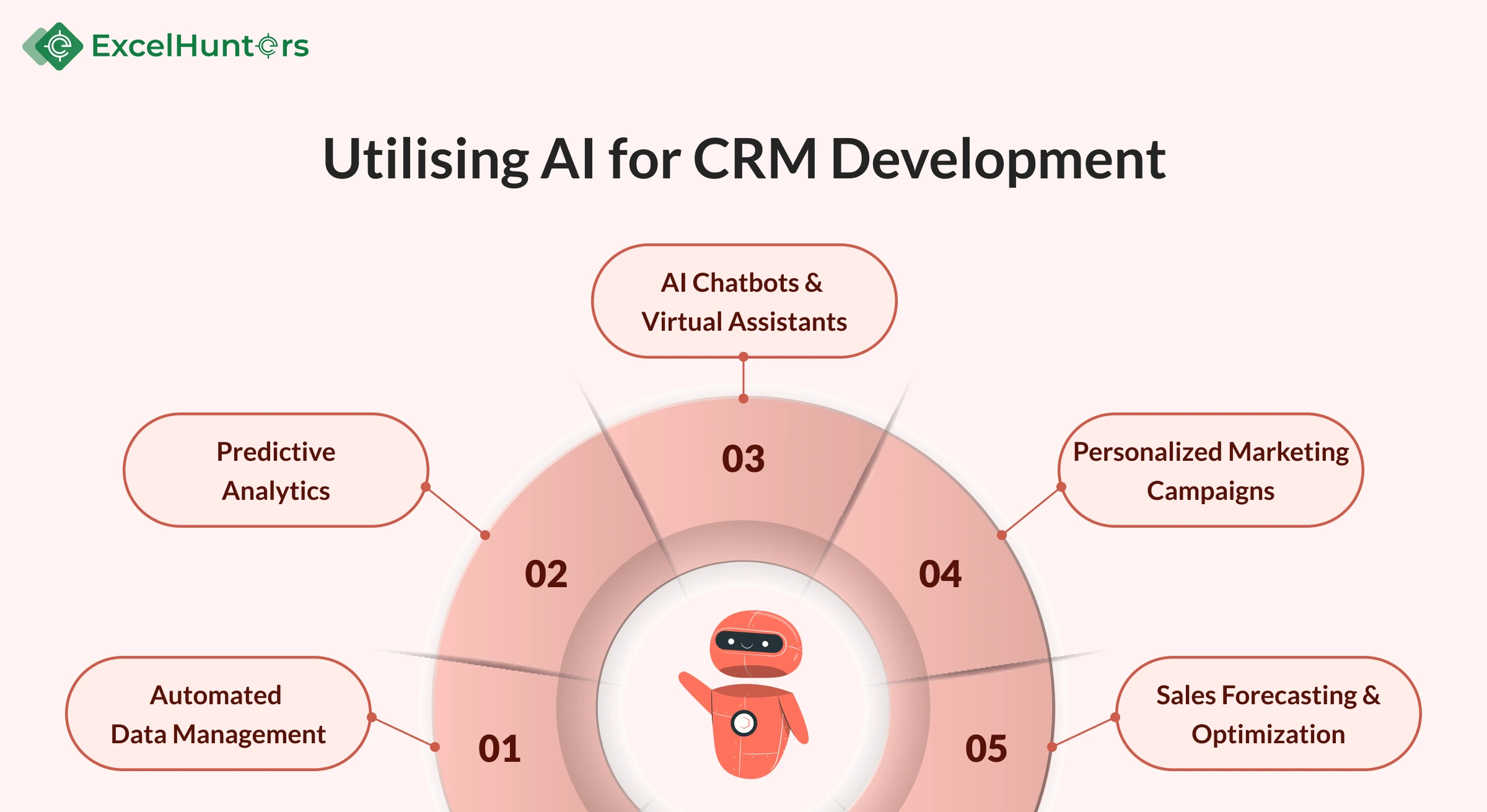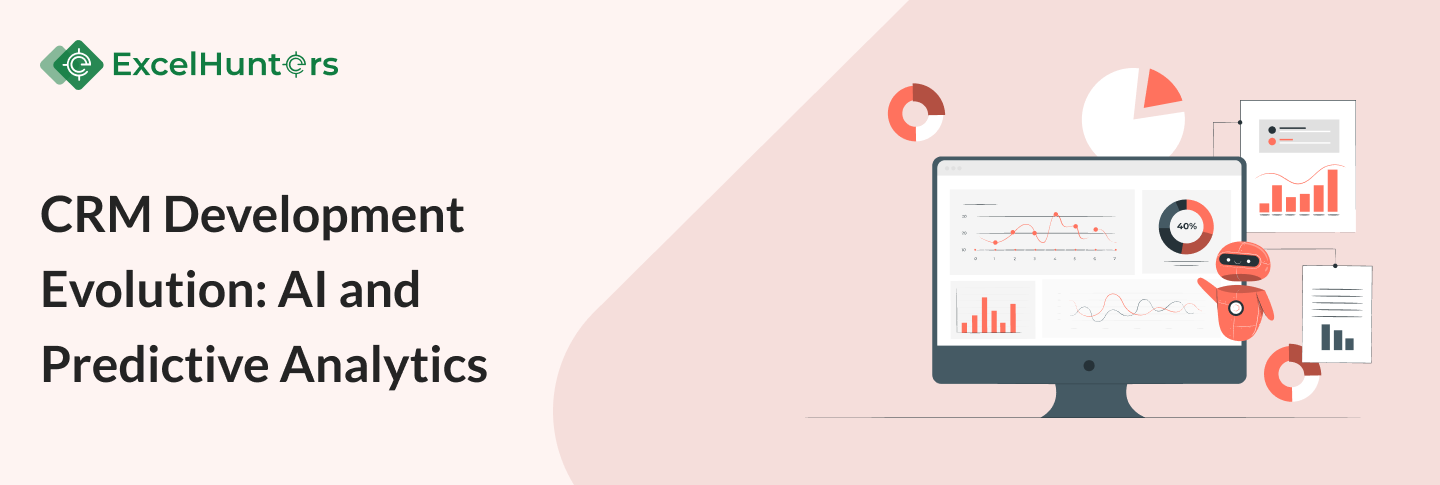The Evolution of CRM Development: Embracing AI and Predictive Analytics
An Overview of CRM Development
In the 20 years since its inception, customer relationship management (CRM) has evolved considerably. Platforms for predictive analytics powered by artificial intelligence have transformed what were once basic database management systems, changing the way companies engage with their consumers. These days, CRM systems enabled by AI make it easier to engage customers, tailor their experiences, and boost company growth than ever before.
The Classic CRM and the AI-Enabled CRM
Originally, customer relationship management software’s main functions were to store client data and facilitate the management of sales pipelines. Sales and customer service personnel had to manually record encounters with these older systems because they relied on data input. The problem was that they weren’t very good at making predictions or providing insights in real time.
Through the use of machine learning algorithms and natural language processing (NLP), sophisticated AI-powered customer relationship management systems automate numerous facets of client engagement, allowing for the analysis of massive datasets, the identification of patterns, and the anticipation of client demands. Because of this change, companies can now provide highly customised experiences to their customers, which boosts engagement and conversion rates.
Utilising AI for CRM Development

1. Intelligent Administration and Processing of Data
By automating data gathering and analysis, AI has completely transformed CRM data management. Businesses can benefit from data-driven decisions made possible by machine learning algorithms, which analyse both structured and unstructured data to uncover important insights. The problem of erroneous or missing data, which frequently affects older CRM systems, is therefore resolved.
2. Improving Decision Making using Predictive Analytics
By analysing previous interactions, purchases, and browsing trends, predictive analytics within contemporary CRM systems allow companies to foresee consumer behaviour. Companies can benefit from predictive modelling in several ways:
- Predict the rate of client attrition.
- Single out promising leads.
- Ads can be made more personalised.
- Make the most of your sales funnel.
3. Streamlined Interactions with Customers
Chatbots and virtual assistants powered by AI are essential in automating CRM processes. With the use of natural language processing (NLP), these systems can comprehend consumer enquiries and respond instantly, cutting down on the need for human agents. This means that companies can:
- Give customers support at all times.
- Make self-service portals better for customers.
- Conversational AI can enhance lead nurturing.
4. Personalized Marketing Campaigns
Businesses can divide their audiences into subsets according to their demographics, interests, and interactions with the help of AI-powered CRM tools. Highly focused campaigns are created using marketing automation solutions backed by AI, which leads to:
- More people are opening and clicking on emails.
- More precise advertising
- Better client retention rate
5. Sales Forecasting and Optimization
More accurate revenue predictions are possible with the help of sales teams who use AI-powered forecasting. By analysing market conditions, customer behaviour, and sales data from the past, CRM technologies can provide valuable insights for:
- Modifying pricing approaches
- Finding new avenues for revenue generation
- The shortening of the sales cycle
Predictive Analytics’ Effect on CRM Effectiveness
Predictive analytics has transformed CRM efficiency by allowing businesses to:
Get more leads in less time with the help of artificial intelligence systems that sift through mountains of data to find the ones most likely to convert.
Reduce wastage of time and energy by directing marketing and sales teams’ attention to prospects with a high conversion rate.
Improve customer lifetime value (CLV) through anticipating consumer wants and requirements and meeting those demands through personalised service that encourages repeat business.
Difficulties in Implementing AI-Driven CRM
Developing CRM with AI still has its fair share of obstacles, notwithstanding all the good it can do:
1. Issues with Data Security and Privacy
Adherence to stringent data privacy standards, like GDPR and CCPA, is essential for organisations as AI gathers and analyses massive volumes of consumer data. The key to keeping customers’ trust is making sure their data is stored securely and that AI is used ethically.
2. Exorbitant Costs of Implementation
Huge investments in infrastructure, training, and data integration are necessary to integrate AI-powered CRM solutions. Affording sophisticated CRM systems powered by AI could be a challenge for small enterprises.
3. Embracing Change
Employees who aren’t familiar with AI-driven workflows sometimes push back against organisations’ efforts to use them. Achieving maximum CRM productivity and a smooth implementation requires proper onboarding and training.
How Artificial Intelligence Will Shape CRM in the Future
1. Hyper-Automation and No-Code AI CRMs
Artificial intelligence (AI) powered workflows will revolutionise customer relationship management (CRM) in the future by streamlining operations ranging from lead generation to post-sale support. Furthermore, companies will be able to implement AI solutions with little to no coding experience with the help of no-code AI CRMs.
2. Combining Voice Dialogue with Emotion Recognition
Voice recognition and emotion analysis will be used by AI-powered CRM systems to gain a better understanding of client mood during chats and phone calls. The sales and support staff will be able to respond to customers more effectively by taking their emotions into account.
3. Social Media Prediction Assisted by AI
With the use of social listening solutions powered by artificial intelligence, companies will be able to monitor customer sentiment across various social media platforms. This will help them spot patterns and handle possible customer issues before they get out of hand.
4. Integrating Blockchain Technology to Strengthen Data Security
To tackle data privacy problems, CRM solutions of the future will use blockchain technology, guaranteeing secure, transparent, and tamper-proof administration of client data.
In summary
The quick progress in artificial intelligence and predictive analytics has been the driving force behind the evolution of CRM development. New possibilities for customer engagement, sales optimisation, and predictive decision-making will open up as more and more firms use CRM solutions driven by AI. Nevertheless, dealing with issues related to data security, cost, and user adoption is crucial for a successful adoption.
To succeed in today’s cutthroat digital market, companies must use intelligent automation, predictive modelling, and personalised consumer interactions.
Looking for
Consultations?Our Expertise
- 8 + years of experience
- Adept Developers
- Excel at Agile Development
- Cost-Effective


